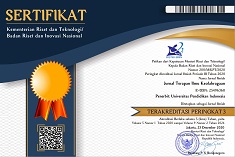Focus and Scope
Jurnal Terapan Ilmu Keolahragaan (JTIKOR), Focus: Scope: issued twice a year, accepts for publication articles in sports sciences including:
- sports technology;
- sports engineering;
- sports medicine;
- exercise physiology;
- sports biomechanics;
- sports sociology;
- sports psychology;
- physical activity and health.
Section Policies
Articles
Peer Review Process
All published articles in Jurnal Terapan Ilmu Keolahragaan, the manuscript must be passed through an editorial review. All articles will go through a blind review process. The first stage of the review process is carried out by a team of editors with a period of between 1-2 weeks, related to plagiarism checks and template completeness. The second stage of the review is carried out by the reviewer team within a period of 2 - 3 weeks.
The submitted manuscript in JTIKOR (Jurnal Terapan Ilmu Keolahragaan) will be checked in terms of writing guidelines by the editorial team. After an initial check by editors for writing guidelines, articles are then sent to reviewers assigned by the editor in chief to evaluate for the feasibility of the content, focus, materials & methods, result & discussion, and conclusion.
After comments and suggestions from reviewers are received, the article then will be sent back to the author to make the revision. The author should facilitate all notes from reviewers. After re-submission by the author, The approval of re-submitted articles will be discussed at the meeting of the editorial team.
The editorial team is responsible for making a decision on whether articles are appropriate to be published or not. The editorial team can be guided by a policy board of the editorial team and is limited by law as to be enforced regarding libel, copyright infringement, and plagiarism. Regarding the plagiarism, the editorial team will be used the Turnitin software and Google Scholar network. Maximum allowable similarity is 25%.
Open Access Policy
This journal provides immediate open access to its content on the principle that making research freely available to the public supports a greater global exchange of knowledge.
Archiving
This journal utilizes the LOCKSS system to create a distributed archiving system among participating libraries and permits those libraries to create permanent archives of the journal for purposes of preservation and restoration. More...





